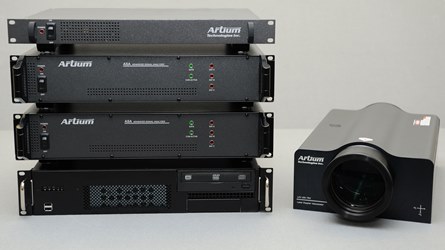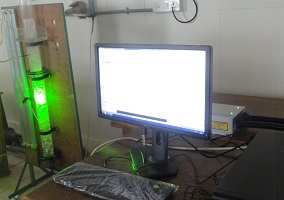 |
Narasimha Mangadoddy Ph.D., JKMRC, University of Queensland M.Tech., IIT Kanpur |
| Electrical Resistance Tomography (ERT) | |
|
An ERT system gives
the images based on the internal conductivity distribution of
contents of geometry (i. e. like hydrocyclone, vertical pipe
flows, bubble column etc.) from the measured boundary voltages.
We are equipped with
ITOMS
ERT with a capturing data range of 1000-2000 dual frames per
second. We have 76mm conical and 100mm cylindrical
geometries with 16 electrode sensors. Our main focus is to work
the experiments with various designs and operating conditions
through the ERT for slurries of various concentrations. The
obtained phase concentration profiles from the ERT are used to
validate against the CFD. Hence a variety of designs can be
tested through CFD. |
 |
|
High Speed Video Camera (HSVC) |
|
|
We are equipped with PHOTRON camera with 1 MP at 2000 fps, 120,000 fps at 128X128 pixel, shutter speed of 1µs. We also possess 12X high magnification zooming lens for micro study, automatic copy stand for flow measurements. This camera us used to measure the solid flow velocities in the pilot scale fluidized bed, two-phase air-core measurements in the acrylic bases hydrocyclone systems, bubble velocity measurements in bubble column and measurements in micro channel flows |
 |
|
Laser Doppler anemometry (LDA)-2D |
|
|
LDA system is used to measure the point based velocities
in a transparent or semitransparent flows on the basis of
Doppler shift in a laser beam. This technique is also
non-intrusive and can measure all the three velocity components.
Neutrally buoyant seed particles are used to scatter the light.
The seed particles are illuminated by a known frequency of laser
light using optical transmitter. The scattered light is detected
by the optical receiver. |
 |
|
Particle Image Velocimetry (PIV) |
|
|
Particle Image
Velocimetry (PIV) is a non-intrusive laser optical measurement
technique for research and diagnostics into flow, turbulence,
microfluidics, spray atomization and combustion processes.
Standard PIV measures two velocity components in a plane (2D2C)
using a single CCD or CMOS camera. We are equipped with
DANTEC PIV with 200 ns interframe for
high speed applications. Time resolved PIV benefits from the
advances in CMOS camera technology to acquire high resolution
PIV images at frame rates up to 16000 fps (frames per second)
with full camera resolution. |
 |
|
Particle Size Analyzer (PSA) |
|
|
MICROTRAC S 3500 particle size analyzer with a
sample delivery controller uses tri laser technology to provide
accurate and reliable particle size information in both wet and
dry mediums. Particle size range varies from 0.02 to
2860microns. It Works on the principle of light scattering
technology using Fraunhofer diffraction method. Improvements
include Mie scatter theory and differential polarization
techniques. |
 |
|
Electrical Capacitance Volume Tomography (ECVT) |
|
|
An ECVT system gives the images based on the internal permitivity distribution of contents of geometry (i. e. like fludization, vertical pipe flows, bubble column etc.). We equipped with TECH4IMAGING ECVT sensor with 24 channels and 102mm straight cold flow section. It is mainly using for the purpose of understanding the fundamentals of gas-solid fluidized beds. |
|
|
Optical Fiber Probe |
|
|
We have GLAB developed compact optical fiber systems for the measurement of both particle concentration and particle velocities under typical fluidization operating conditions. |
|
|
Computational |
|
|
1. 512 node High Performance Computation facility 2. 8 high end work stations 3. CFD commercial tools a. Ansys's all the modules b. EDEM (discrete element method) c. JKSimMet d. Star CCM e. COMSOL |
|
|
Mineral Processing |
|
|
1. Jaw Crusher 2. Bond Indexed Ball mill 3. Ball mill (Variable speed) 4. Rod mill 5. Pulverizer 6. Vibrating sieve shaker (With standard sieve sets, bigger screens with 4, 10, 25, 50 mm) 7. Flotation Cell 8. Sink and Float analysis 9. Sedimentation 10. Jar test apparatus 11. Hydrocyclone test rig (1", 2", 3", 4" cyclones) 12. Plate and frame pressure filter press |